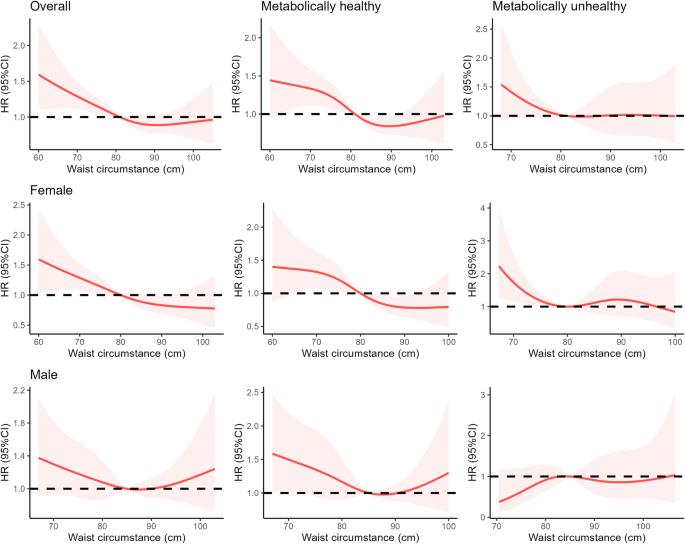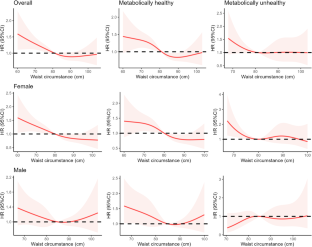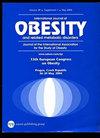中国老年人群代谢性肥胖表型与全因死亡率:一项前瞻性队列研究。
IF 4.2
2区 医学
Q1 ENDOCRINOLOGY & METABOLISM
引用次数: 0
摘要
背景:据报道,老年人中存在肥胖悖论。然而,肥胖的有利影响是否取决于代谢状况在很大程度上仍是未知数。我们旨在探讨中国高龄人群中代谢性肥胖表型及其变化与全因死亡率的关系:这项前瞻性队列研究纳入了 1207 名中国高龄老人(平均年龄 91.8 岁)。代谢性肥胖表型由中心性肥胖和代谢状态决定,参与者被分为代谢健康肥胖(MHO)、代谢不健康肥胖(MUO)、代谢健康非肥胖(MHN)和代谢不健康非肥胖(MUN)。通过 Cox 回归模型估算了危险比(HRs)和 95% 置信区间(95% CIs):结果:在 5.3 年的随访期间,共记录了 640 例死亡病例。与非肥胖相比,肥胖与代谢健康参与者的死亡风险降低有关(HR,0.75;95% CI,0.63-0.91),而与代谢不健康参与者的死亡风险降低无关紧要。与 MHO 相比,MHN(HR,1.27;95% CI,1.06-1.53)和 MUN(HR,1.49;95% CI,1.10-2.02)与死亡风险增加显著相关。与稳定的 MHO 患者相比,从 MHO 转为 MUO 的患者的死亡风险更高(HR,1.81;95% CI,1.06-3.11):结论:MHO预示着中国高龄人群的生存率更高。这些研究结果表明,对于代谢健康的高龄成年人来说,确保对代谢健康的最佳管理是有益的,并应根据个人体重谨慎减肥。本文章由计算机程序翻译,如有差异,请以英文原文为准。


Metabolic obesity phenotypes and all-cause mortality among the Chinese oldest-old population: a prospective cohort study
The obesity paradox has been reported among older adults. However, whether the favorable effect of obesity is dependent on metabolic status remains largely unknown. We aimed to explore the association of metabolic obesity phenotypes and their changes with all-cause mortality among the Chinese oldest-old population. This prospective cohort study included 1207 Chinese oldest old (mean age: 91.8 years). Metabolic obesity phenotypes were determined by central obesity and metabolic status, and participants were classified into metabolically healthy obesity (MHO), metabolically unhealthy obesity (MUO), metabolically healthy non-obesity (MHN), and metabolically unhealthy non-obesity (MUN). The hazard ratios (HRs) and 95% confidence intervals (95% CIs) were estimated by Cox regression models. During 5.3 years of follow-up, 640 deaths were documented. Compared with non-obesity, obesity was associated with a decreased mortality risk among participants with metabolically healthy (HR, 0.75; 95% CI, 0.63–0.91) while this association was insignificant among metabolically unhealthy. Compared to MHO, MHN (HR, 1.27; 95% CI, 1.06–1.53) and MUN (HR, 1.49; 95% CI, 1.10–2.02) were significantly associated with an increased mortality risk. Compared to those with stable MHO, those transited from MHO to MUO demonstrated a higher mortality risk (HR, 1.81; 95% CI, 1.06–3.11). MHO predicts better survival among the Chinese oldest-old population. These findings suggest that ensuring optimal management of metabolic health is beneficial and taking caution in weight loss based on the individual body weight for the metabolically healthy oldest-old adults.
求助全文
通过发布文献求助,成功后即可免费获取论文全文。
去求助
来源期刊

International Journal of Obesity
医学-内分泌学与代谢
CiteScore
10.00
自引率
2.00%
发文量
221
审稿时长
3 months
期刊介绍:
The International Journal of Obesity is a multi-disciplinary forum for research describing basic, clinical and applied studies in biochemistry, physiology, genetics and nutrition, molecular, metabolic, psychological and epidemiological aspects of obesity and related disorders.
We publish a range of content types including original research articles, technical reports, reviews, correspondence and brief communications that elaborate on significant advances in the field and cover topical issues.
 求助内容:
求助内容: 应助结果提醒方式:
应助结果提醒方式:


